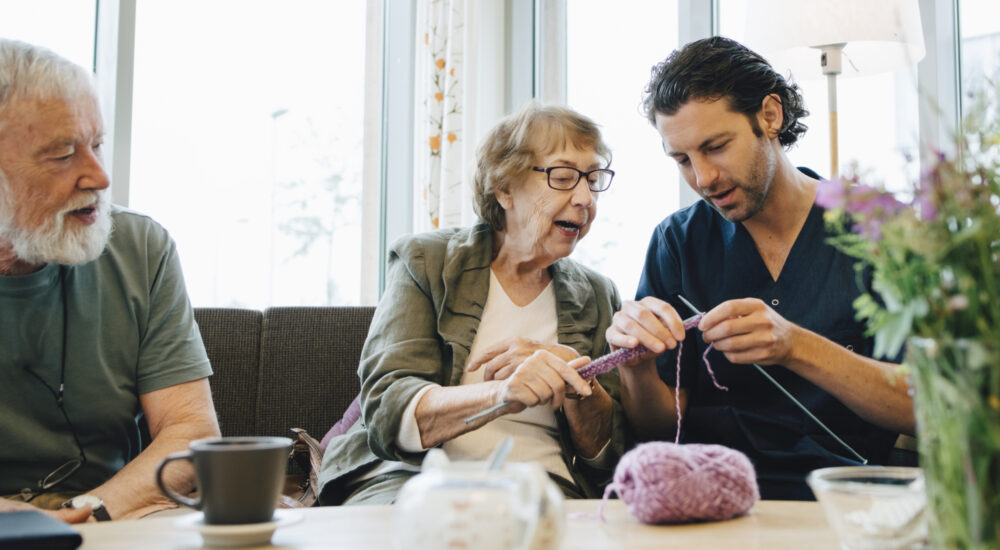The Australian experience
Bringing the Sanctuary model to Australia and adapting it for the Australian context, particularly through the addition of cultural safety, is a journey that began in 2008 with MacKillop Family Services' search for a trauma-informed organisational model.

2008-2010
The Sanctuary model had a positive reputation and was successfully implemented in many countries, providing organisations with the tools and knowledge necessary to create trauma-informed communities.
Several community service organisations and the Department of Child Protection in Western Australia had commenced implementing Sanctuary. As part of their respective roles at the time in the Department of Human Services in Victoria, Dr Robyn Miller and Gerard Jones brought the Sanctuary Faculty Consultants from New York to Melbourne as a kick-off event for the launch of the Victorian Therapeutic Residential Care Model.
This professional development for key personnel from the sector included Micaela Cronin, who was appointed as the CEO of MacKillop Family Services (MacKillop) in 2010.
2011-2012
MacKillop Family Services had begun looking worldwide for a trauma informed organisational model. Specifically, MacKillop was looking for a model which:
- Established clear expectations and norms for staff as well as those they served
- Provided shared language and trauma approaches
- Improved understanding of trauma and its impact on self and others
- Improved consistency in responses to children and families
- Improved behaviour management and relationship strategies for staff
- Increased staff satisfaction and engagement leading to improved staff retention
- Improved organisation-wide decision making
- Provided evidence-based improvement in outcomes for children and families
The key feature of the Sanctuary model that appealed to MacKillop leaders was that it intentionally focused on enabling the organisation to better support staff wellbeing, as well as supporting those children and families impacted by adversity.
As part of the investigative process, MacKillop CEO Micaela Cronin, Gerard Jones, now MacKillop Deputy CEO, and Victoria's first Child Safety Commissioner, Bernie Geary attended the Sanctuary network days in New York in November 2011. During this time, they visited the Andrus Centre in Yonkers, New York. Andrus had partnered with Dr Sandra Bloom to create the Sanctuary Institute, situated at the Yonkers site. This visit enabled MacKillop leadership to better understand the implementation of Sanctuary across a large organisation providing residential care and diverse programs.
At the conclusion of this process, a proposal was put to the MacKillop Board and approved for MacKillop to begin the journey to become a Sanctuary organisation.
MacKillop contracted the Sanctuary Institute, USA to provide training and consultation for a group of 70 key staff including Board members, MacKillop's operational executive and the newly formed Sanctuary core team. This initial training was completed in 2012 and the process began, under the management of Ilkin Il, the new Director of Clinical Services, to train the rest of the staff across Victoria and NSW.
2013 - 2015
MacKillop developed a two-day staff training to roll out Sanctuary in 2013 to 600 staff across Victoria and New South Wales. MacKillop's staffing group grew to over 1000 during the first three years of implementing the Sanctuary model. This growth presented a significant challenge to the training model which was built predominantly, on internal staff providing training under the leadership of Ilkin Il in addition to her role as Director of Clinical Services. Nevertheless, internal initial training for over 1000 staff was successfully completed during this time.
Also during this time, MacKillop's first core team, led the implementation. This core team had membership from across all organisational, geographic and program areas and established local implementation teams (LITs) to ensure that all voices were heard and the commitments were embedded in policy and operationalised in every office.
A distinctive set of visuals to support the implementation process across MacKillop was produced in partnership between the clinical team, core team and MacKillop's training unit. These Sanctuary materials designed by MacKillop's community engagement team were installed in every office and residential home.
A key task of the first core team was to establish a process for collecting evidence for Sanctuary certification. The core team in partnership with the quality & practice improvement team undertook this task.
The first certification of MacKillop Family Services was conducted by Maxine Reddy, the USA certifier, together with peer certifier Kellie Goes from the Department of Child Protection in Western Australia. The certifiers were presented with substantial evidence from across the organisation and visited offices and practice locations in both Victoria and New South Wales.
The first certification process was completed successfully with the certifiers finding MacKillop had achieved the required standard in all 28 Sanctuary certification standards.
2016-2017
On completion of the first certification, MacKillop approached the Sanctuary Institute, USA with the proposal to be the licenced Australian provider of Sanctuary training and consultation to organisations across Australia and New Zealand. This proposal was accepted and MacKillop launched the Sanctuary Institute Australia in March 2016 under licence to Julia Dyckman Andrus Memorial (USA). This was the first time that an organisation other than the Andrus / Sanctuary Institute USA had been contracted to undertake this role.
The Sanctuary Institute Australia was established as a trauma-informed learning and training community, made up of expert Sanctuary practitioners selected from within MacKillop and other Sanctuary organisations across Australia. These experts became the founding members of the new Australian Sanctuary Institute faculty. Many of them were already highly experienced trainers of Sanctuary in their own organisations and beyond. Together they set about adapting the five-day training for the Australian context. Sanctuary Institute Australia was now ready to promote and contract with other Australian organisations to deliver the Sanctuary model and provide consultation services to support implementation in each organisation.
A formal Sanctuary Institute Australia launch tour was conducted in most capital cities, led by Sarah Yanosy, the Director of the Andrus Sanctuary Institute USA and Gerard Jones the inaugural Director of the Sanctuary Institute Australia.
As one of its first official tasks in 2016, the Sanctuary Institute Australia negotiated with the Sanctuary Institute USA to significantly strengthen the concept of cultural safety in the Sanctuary model for the Australian context, which lead to cultural safety being added to the domains of safety and the Australian standards.
2018
By 2018, Sanctuary Institute Australia had contracted five organisations. The inaugural Australian Sanctuary network day was held in March 2018 in the MacKillop chapel and delegates came from all eight Australian Sanctuary organisations. The keynote presenter was Dr Sandra Bloom and an air of enthusiasm and celebration was shared amongst all for a strong network of learning, knowledge sharing and advocacy.
The Sanctuary in context tour was undertaken throughout 2018, conceived as a way to promote the flexibility and adaptability of the Sanctuary model. The message was that Sanctuary implementation and professional learning programs can be tailored to specific needs and desired outcomes. Sanctuary in context was conducted in Melbourne, Sydney, Perth and Adelaide. Several new client organisations emerged from this tour.
As a learning community, MacKillop provided two opportunities for Sanctuary based PhDs to research the impact of the Sanctuary model in the Australian context. These PhDs were completed in 2021 and will add to the breadth of international research already demonstrating the efficacy of the Sanctuary model in Australia.
Strengthening the cultural safety of the Sanctuary model continued and expanded with the establishment of the Aboriginal and Torres Strait Islander cultural safety reference group, led by Esmai Manahan and other MacKillop First Nations staff and allies. The reference group met for the first time in South Melbourne in November 2018 and included Tammy Mann from Churches of Christ Queensland.
In preparation for MacKillop's second round of certification, the core team determined that evidence would be collected directly from Sanctuary local practice teams (formerly LITs) electronically. An online data collection tool was designed in partnership with the Sanctuary Institute and MacKillop's IT team which allowed staff to upload and annotate their own evidence, linked to the appropriate standard.
2019
MacKillop's re-certification was scheduled for June 2019. By this time, the Sanctuary core team was able to curate a collection of high quality, multimedia representations of Sanctuary in action across all MacKillop programs. The assembled evidence, a thorough narrative of the process and learnings, together with the presentations from local teams, resulted in the repeat certifiers, Maxine Reddy (US) and Kellie Goes (WA CP) granting recertification with no recommendations for improvement.
The Aboriginal and Torres Strait Islander cultural safety reference group reconvened in the Mary MacKillop Centre in Sydney in September 2019. This time, the reference group was broadened to include First Nations people from other Sanctuary organisations representing Churches of Christ QLD and Anglicare Southern NSW and ACT. A set of culturally safe commitments were drafted and a cultural Sanctuary model was advocated as the way forward to ensure true cultural safety.
In November, MacKillop hosted the Lead the Way Towards Wellness Conference in Sydney. This conference had a significant focus on Sanctuary and featured evidence and evaluations from range of MacKillop programs. This conference was also the official launch of The MacKillop Institute, which would take over the work of the Sanctuary Institute Australia and stewardship of the Sanctuary model development. The MacKillop Institute is now the Australian and New Zealand Sanctuary training and consultancy provider.
2020
The MacKillop Institute represented a broadening of MacKillop's intention to deliver evidence-informed programs to government, community, educational and corporate organisations across Australia and internationally. A part of MacKillop Family Services, The MacKillop Institute now provides a suite of evidence-informed programs and services to support those who have experienced change, adversity, loss, grief and trauma.
More Resources

It’s time to rethink residential aged care
In partnership, the University of Melbourne and The MacKillop Institute are calling for a whole of sector rethink about the delivery of residential aged care in Australia. We should conceptualise residential settings as ‘intentional communities’ that provide a home ‘sanctuary’ for residents.
Recommended reading

